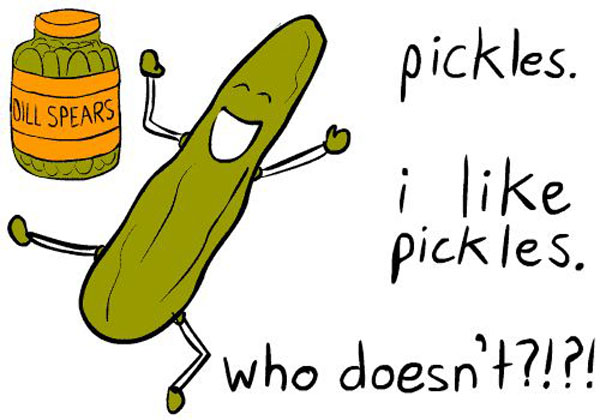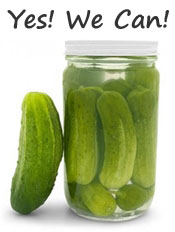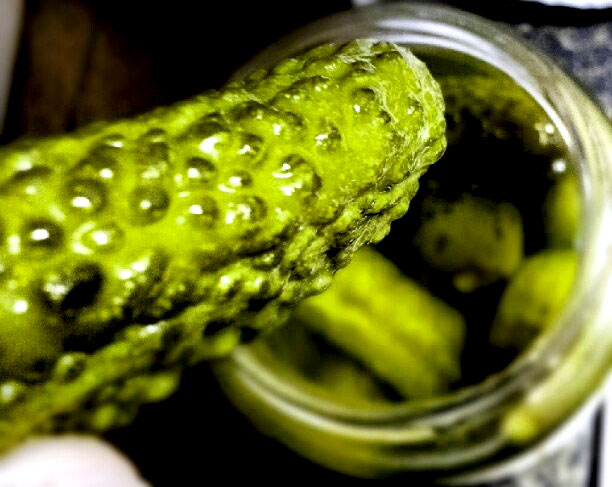The Wise Pickle Said…
“The ‘in trouble’ meaning of ‘in a pickle’ was an allusion to being as disoriented and mixed up as the stewed vegetables that made up pickles…circa 1440. The figurative version of the phrase, meaning simply ‘in a fix’…arrives during the next century.”
– The Phrase Finder
Oh, the salty-snap, the crisp-sweet crunch, the rush of complex spices as they burst across the pallet in that first chew of a pickle! Can you tell that I love ‘em? They’re ultra-low calorie fun. I’ve been perfecting my pickle recipe this Summer in preparation for Fall’s pickling of unfinished tomatoes and peppers.
I’ve learned along the way that I’ll pickle almost anything. Tomatoes, peppers, watermelon and canary melon rinds—even Swiss chard and kale stalks. I’ve also learned some interesting stuff from the wise ol’ pickle himself, and I thought I’d share his insights. As the Wise Pickle said, the right attitude in our “pickles of life” can bring out our best flavor. Of course, I share my super-easy pickle blend and method below, too.
The Self in the Sour
“What is joy without sorrow? What is success without failure?…You have to experience each if you are to appreciate the other. There is always going to be suffering. It’s how you look at your suffering, how you deal with it; that will define you.”
– Mark Twain, Satirist
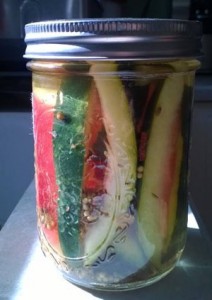 As I said, I’ve pickled many things this Summer and none of them have lost their inherent flavor, only intensified it. The same can be true of people who become immersed in difficulty, just like the pickle is immersed in spice and vinegar. We will become “tastier” people, if we stay “real” and let the struggle enhance our flavor.
As I said, I’ve pickled many things this Summer and none of them have lost their inherent flavor, only intensified it. The same can be true of people who become immersed in difficulty, just like the pickle is immersed in spice and vinegar. We will become “tastier” people, if we stay “real” and let the struggle enhance our flavor.
“Being real means acting with authenticity,” said Katie Comtois, (2013) Mental Health Counselor and Work-Life Integration Coach. This is one element of a three part recipe for healthy living that also involves being whole and being innovative. Right now, as the pickle teaches, to be tasty is to know yourself and let your flavor be enhanced by the inevitable brine. Key is to develop self-knowledge in the calm moments so that you can take authentic actions when you’re suddenly hit with the boiling vinegar of life.
A Balanced Brine
“How camest thou in this pickle?”
-Alonso, The Tempest, William Shakespeare
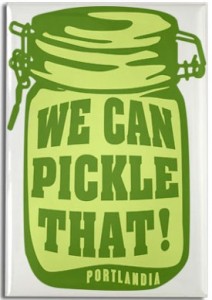 I spent the Summer adding a pinch of dill, a few mustard seeds, and pondering if the brine needed one all-spice nugget or two. Surprising to me—in light of my love affair with salt—I kept adding less and less of the white wonder. I came to realize that, though I will forever adore my salt shaker, I was overpowering the other flavors of the brine. I began to strive for balance, then for integration of flavors.
I spent the Summer adding a pinch of dill, a few mustard seeds, and pondering if the brine needed one all-spice nugget or two. Surprising to me—in light of my love affair with salt—I kept adding less and less of the white wonder. I came to realize that, though I will forever adore my salt shaker, I was overpowering the other flavors of the brine. I began to strive for balance, then for integration of flavors.
“Balance, as I understand it, often requires that people make trade-offs, compromising satisfaction in one or more areas of their lives to fulfill responsibilities in another,” said Comtois (2013), “Compromising in this way can leave people feeling inauthentic, disconnected, and stressed.” Just like when I over-salted.
Like a flavorful pickle, our lives must integrate all aspects of work, home, community, and self. “The process requires that we purposefully explore how the different aspects of our lives connect and relate to each other,” we taste each aspect of our lives and blend them to suit our taste (Comtois, 2013). As Alonso noted above, as long as we know how we “camest” into this pickle, and that it is of our own recipe, it need not be a bad thing.
Pickling Our Problems
“When effectively combined, being real, whole, and innovative enable us to enhance our own well-being,” Comtois said. She and Integrated Living, purport that a “whole” person sees how the different aspects of life blend together, while the innovative individual experiments with both that blend and their actions within it (2013). The Wise Pickle said it best, “It’s your brine, know it well and spice it up often.”
We can pickle almost anything, and therefore any problem life throws at us can become a tasty treat as long as we know our own inherent flavor, the balance of our brine and allow the time to let it cook.
A Personal Pickle Recipe
The Brine: (for one 12 ounce jar)
1 cup water.
1-1.5 tablespoons coarse kosher salt to taste.
That’s it!
The Spice Blend: This is the fun part. Get crazy! (see below*)
My most common is:
4-6 Allspice seeds
5-8 Mustard Seeds
Fresh Basil (5-8 leaves)
Fresh Dill (a healthy dose—1/8 handful)
½ tablespoon of chopped garlic
* An integrated spice blend is whatever you’re interested in. Aside, or along with the common blend above, I’ve also mingled celery seed, cumin seed, pickling spice, turmeric, tarragon, chilies and I’m soon to try ginger root, rosemary, bacon and nacho. The cool part of making a small, weekly or monthly batch—your tastes change, so change the blend. Remember, the Wise Pickle said be innovative.
The Method: It’s super easy.
1. Get a 12-16 ounce canning jar (the ones with the vacuum sealing 2 piece lid)
2. Cut up your vegetable into sizes that will fit in your jar then jam ‘em in.
3. Boil the spices and the liquid together until it rolls, then simmer for a few minutes more. Your goal is to get the spices flowing and the brine hot.
4. Carefully pour the brine over the veggies until they’re covered then close the lid as tight as you can.
5. Here’s the hard part: Don’t open it for 24 hours. I usually let mine cool a bit on the counter and then move it into the fridge while still warm. I put a new jar into a larger, sealed Tupperware container just to be certain it didn’t leak or shatter—though it’s never happened to me, and canning jars are designed not to—until I know my jar well. It may be an unnecessary precaution, but I don’t want a pickle fridge.
Enjoy your pickles be they vegetable or real life—crunch and savor your personal blend!
__________________________________________________
Comtois, K. (2013) Integration is better than balance. Positive Psychology News Daily. Retrieved from: http://positivepsychologynews.com/news/katie-comtois/2013012025263

